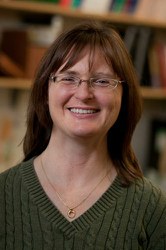
How did you become interested in rural sociology?
To tell this story, I need to go back to my senior year of high school in Winneconne, Wisconsin. Although my school was relatively small, I took a sociology class in which my project was to conduct a survey of students. The same year, I job shadowed at a local marketing company, and got to see first-hand how they also use data to figure out (and exploit) purchasing patterns. I could see this first-hand in my job at a local grocery store, how product placement and advertising influenced purchasing. I became fascinated by the idea that we could use data to see patterns in how people act. This notion resonated with me as I thought about how my own family and community experiences could be linked to broader social forces influenced by businesses, family structures, gender, and local cultures. So as I finished my college applications, I declared a major in sociology with the goal of teaching social science at the high school level.
As a student at the University of Wisconsin Oshkosh, I had the opportunity to work directly with faculty to expand my skills and knowledge of the discipline. I was hired by Dr. Jerry Stark to do academic research, including conducting annual program evaluations for his first-year residential program and conducting survey research on treaty rights in northern Wisconsin. I also became his teaching assistant for the research methods course.
Through departmental support, we revived the Sociology Club and created opportunities for students to present research at academic conferences both at UWO and through the Wisconsin Sociological Association. I went on to graduate school at UW-Madison, where my main interests were in gender and environmental sociology. Grad school allowed me to explore my interests in rural sociology but also engage in interdisciplinary and applied work in agriculture and environmental issues. I graduated in 2002, and have been at Penn State since January of 2003 and I now teach one undergraduate course (Society and Natural Resources) and two Rural Sociology graduate courses (Research Methods and Environment and Natural Resource Sociology).
I credit Jerry Stark with seeing something in me that I didn’t yet see, and nurturing my interests in research and teaching. He challenged my thinking daily, taught me that theory and research are practical and essential for making informed decisions. The sociology program helped me see social systems in a new way, to see that social structures and institutions shape our views and opportunities, but that we have the ability to nudge those structures and institutions with concerted, collective action.
If I have any advice for current students, it’s to look for those windows of opportunity, and don’t hesitate to jump in. Even if it doesn’t seem like it’s the exact right fit, you will learn something about the field and something about yourself.

Recent Comments